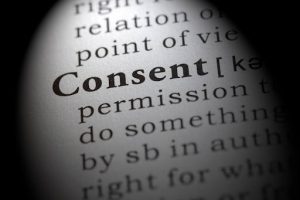A major issue in DUI cases has not been fully fleshed out and has caused a lot of confusion among practicing criminal defense attorneys and judges. When a driver is pulled over and the officer has reasonable suspicion that the driver is under the influence of alcoholic beverages or drugs, does that officer have to obtain voluntary consent before requesting that the driver submit to field sobriety exercises?
The leading case on this issue comes out of the Second District Court of Appeals. In State v. Liefert, 247 So.2d 18 (Fla. 2d DCA 1971), the Second DCA held that when an officer has sufficient cause to believe a driver committed a DUI, the driver’s consent to taking field sobriety exercises is immaterial and the officer can require that the driver submit to them, or the refusal can be used against the driver as evidence of consciousness of guilt.
 In Liefert, an officer observed Mr. Liefert weaving across two lanes of traffic. The officer pulled Mr. Liefert over and noticed an odor of alcoholic beverage. The officer asked Mr. Liefert if he would take some physical sobriety tests and Mr. Liefert agreed. Mr. Liefert was arrested, based in part on the results of the sobriety tests and Mr. Liefert filed a motion to suppress all evidence obtained as The trial court granted the motion finding that the officer did not advise Mr. Liefert of a right to refuse to take the tests.
In Liefert, an officer observed Mr. Liefert weaving across two lanes of traffic. The officer pulled Mr. Liefert over and noticed an odor of alcoholic beverage. The officer asked Mr. Liefert if he would take some physical sobriety tests and Mr. Liefert agreed. Mr. Liefert was arrested, based in part on the results of the sobriety tests and Mr. Liefert filed a motion to suppress all evidence obtained as The trial court granted the motion finding that the officer did not advise Mr. Liefert of a right to refuse to take the tests.
On appeal, the Second DCA reversed holding that consent is immaterial under the Florida Supreme Court’s holding in State v. Mitchell. The Second DCA found that there was sufficient cause to believe that Mr. Liefert was driving while under the influence of alcohol and therefore consent was not relevant.
In the more than fifty years since the Liefert decision,

various county court, circuit court anddistrict court decisions have come to varying conclusions regarding whether voluntary consent is required for field sobriety exercises to be admissible. Courts have taken one of three approaches – 1) voluntary consent is not required if there is reasonable suspicion of DUI , 2) voluntary consent is not required if there is probable cause of DUI, and 3) voluntary consent is always required.
The latest decision has come from the Fifth DCA in State v. Johnson, 5D21-2866 (Fla. 5th DCA, May 5, 2023). In Johnson, the Fifth DCA held that where an officer has reasonable suspicion that a driver is under the influence, the officer does not have to obtain voluntary consent from the driver before directing the driver to submit to field sobriety exercises.
In Johnson, the Fifth DCA analyzed the Liefert decision and found that it was consistent with the Florida Supreme Court’s later decision in State v. Taylor, 648 So.2d 701 (Fla. 1995), which held that a refusal to submit to field sobriety tests was admissible where there was reasonable suspicion of DUI. The Fifth DCA noted that there was nothing in the Taylor decision to suggest that an officer must obtain consent before directing a driver to submit to field sobriety exercises. It follows logically, according to the Fifth DCA, that if the Florida Supreme Court required consent before a refusal to submit to field sobriety exercises could be admitted against a defendant, it would not have found that a refusal was admissible against a defendant that exercises the right to refuse. So, the Fifth DCA held that a defendant has no right to refuse field sobriety exercises and therefore consent is immaterial.
So, in the Fifth DCA, this issue has been foreclosed. A refusal to submit to field sobriety exercises is admissible when an officer has reasonable suspicion that the person has committed a DUI and whether that officer obtained voluntary consent is immaterial.
Of course, consenting to field sobriety exercises is not mandatory and any person can refuse to submit to them. A person cannot be forced to perform field sobriety exercises. However, a  refusal to submit to field sobriety tests can be used against the person in court. This means that if the case goes to trial, a prosecutor can argue to the jury that the person refused to perform the field sobriety exercises because the person knew he or she was impaired and wouldn’t pass. This is called consciousness of guilt. In return, a defense attorney can argue that there are other valid reasons to refuse to submit to the exercises. For example, the person may be acting upon advice previously given or may not trust that the officer is going to conduct the exercises in a fair manner. Despite being standardized tests, they are still subject to a great deal of discretion by the officer.
refusal to submit to field sobriety tests can be used against the person in court. This means that if the case goes to trial, a prosecutor can argue to the jury that the person refused to perform the field sobriety exercises because the person knew he or she was impaired and wouldn’t pass. This is called consciousness of guilt. In return, a defense attorney can argue that there are other valid reasons to refuse to submit to the exercises. For example, the person may be acting upon advice previously given or may not trust that the officer is going to conduct the exercises in a fair manner. Despite being standardized tests, they are still subject to a great deal of discretion by the officer.
 LGL partner Jeremy Lasnetski has more than 20 years of criminal trial experience. He has represented clients in both State and Federal criminal courts since 2008. Before that, he was a state prosecutor between 2001 – 2008 prosecuting gun crimes, organized crime, homicides, and more. He was also the division chief of the repeat offender unit. If you need a criminal defense attorney in Jacksonville, call Lasnetski Gihon Law at 904-642-3332.
LGL partner Jeremy Lasnetski has more than 20 years of criminal trial experience. He has represented clients in both State and Federal criminal courts since 2008. Before that, he was a state prosecutor between 2001 – 2008 prosecuting gun crimes, organized crime, homicides, and more. He was also the division chief of the repeat offender unit. If you need a criminal defense attorney in Jacksonville, call Lasnetski Gihon Law at 904-642-3332.
 Jacksonville Criminal Lawyer Blog
Jacksonville Criminal Lawyer Blog

